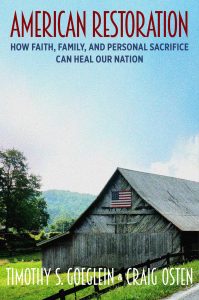
by Timothy S. Goeglein and Craig Osten.
Regnery Gateway, 2019.
Hardcover, 256 pages. $29.
Reviewed by Timothy D. Lusch
It is obvious that America, as elsewhere, is in uncharted territory. It has ever been thus; the future follows no script. But uncertainty hangs about all aspects of life in our age. Rather than give the whiff of opportunity, it menaces and harries. The erosion of shared assumptions, values, and language clogs debate and the flow of ideas. The result is a triumph of extremes. The deliberative mind of the conservative—as elucidated by Russell Kirk—is singularly suited and situated to address our most intractable problems. This is not to say, of course, that the conservative offers specific solutions. That—rather disastrously—has been the province of liberals and progressives.
In Prospects for Conservatives, Kirk argued that the “true conservative knows that the economic problem blends into the political problem, and the political problem into the ethical problem, and the ethical problem into the religious problem. There is a hierarchy of difficulties, as well as a hierarchy of values.” He was keen to avoid “a series of slogans” and a “congeries of recommendations for legislative enactment.” In an age intoxicated with ideology, Kirk’s voice was singular in the wilds of Mecosta. The conservative must hew to first principles, not fashionable programs. “The mind and heart of America, in this tremendous hour,” Kirk wrote, “require an inspiration which cannot come out of the party caucus and the editorial room of the daily newspaper.” Or, he might have added in our day, out of Twitter.
It is in this Kirkian vein that conservatives can look for guidance. We have seen impressive contributions from Anthony Esolen (Out of the Ashes) and Rod Dreher (The Benedict Option) among others. Timothy S. Goeglein and Craig Osten now join this sensible and searching group. It is all to the good—the authors have been on the front lines of academic and policy debates for years—since our troubles are both persistent and pervasive. Multiple paths exist. But without a return to first principles and the practice of virtue, any path is soon lost.
The major theme in this book, unsurprisingly, is restoration. This is an inherently conservative endeavor. As the authors make clear, there is much in our country (and by extension the West) to conserve. And much to restore. It is not blind traditionalism or conservation. It is, rather, to conserve and restore what is good and discard the toxic accretions that afflict us. Goeglein and Osten—far from ideologically rigid—are interested in adapting to our contemporary reality without adopting its lunacy.
These efforts often smack of Ten Point Plans. The remainder bins at bookshops are full of such books; padded and policy-driven, they are not worth conserving. Much of what the authors write is intuitive, at least for the reader who shares their vision. Goeglein and Osten avoid the prescriptive in favor of the persuasive. In chapters on restoring medical ethics, religious liberty, a culture of life, and the concept of the gentleman, for example, a common theme emerges. And it is one we forget—or deny—to our ultimate demise: human dignity. As the authors move through well-trod diagnostic territory, it is obvious that we are facing life and death decisions in all matters of life. The solutions are there. Simple—not easy—and all begin with the protection and promotion of human dignity. Aided by the practice of individual virtue (even knowledge of the virtues would be nice these days), true restoration is possible.
There are echoes here as broad and far-reaching as Nisbet’s The Quest for Community and Brad Miner’s The Compleat Gentleman. But it is with Kirkian resonance, and reflecting a true conservative disposition—as opposed, say, to a conservative sensibility—that Goeglein and Osten elevate the personal over the political. There is political potential, of course, but only as it emerges from the deep work of religious and cultural restoration. The authors rightfully—and in timely fashion—argue for a restoration of Kirk’s hierarchy of difficulties and hierarchy of values. Only by recognizing and repairing what is essential in the life of man can we have any real hope of restoration.
Timothy D. Lusch is a writer. He has appeared in the Toronto Star, Michigan History Magazine, Chronicles, National Catholic Register, and numerous other publications online and in print.